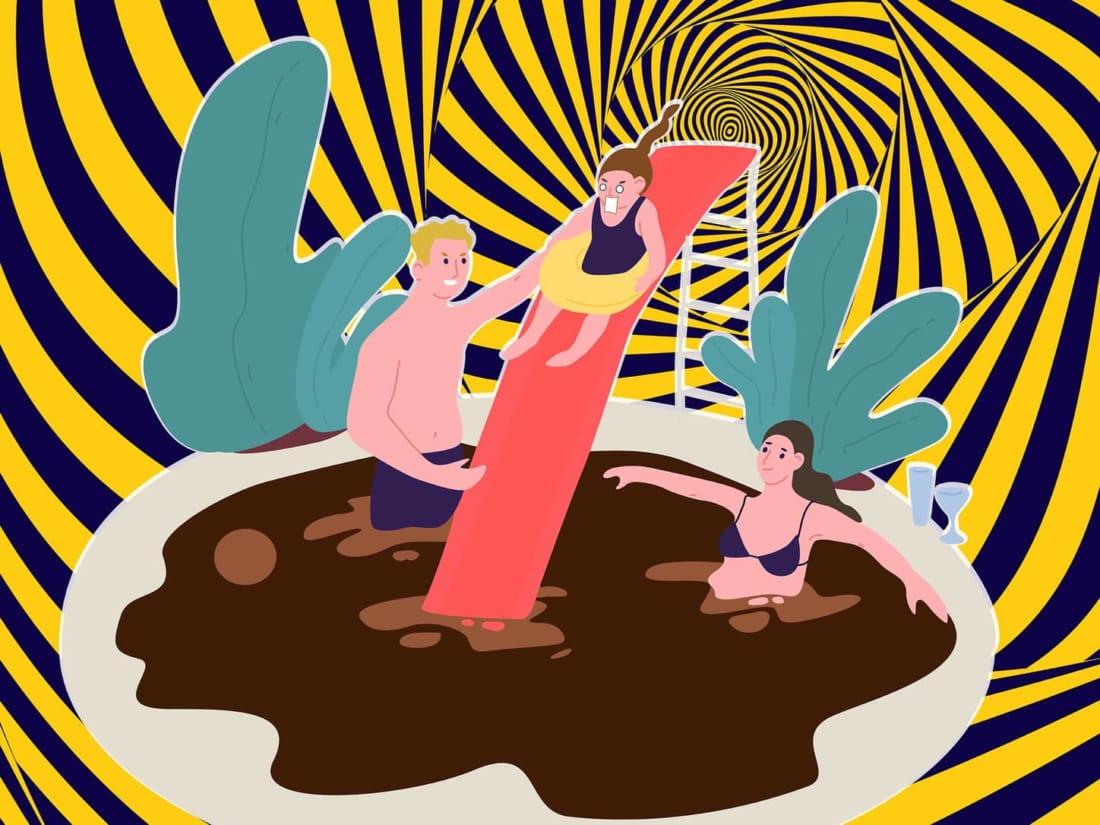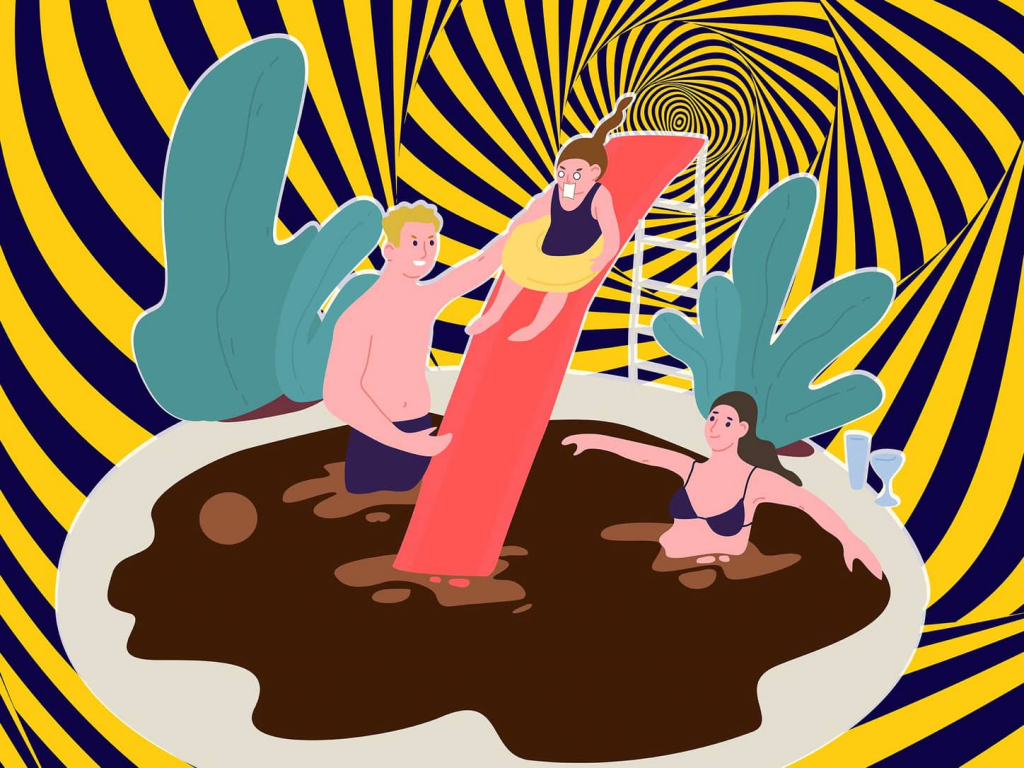
Living in Japan, I sometimes feel I’m already stuck in the afterlife, paying for all my past transgressions, like long vacations. When I worked in a respectable job in Germany, international colleagues and business partners often complained that they could never reach anybody there during the summer months, because everybody was on vacation, all the time. I never understood what they meant; I certainly wasn’t taking excessive amounts of time off. Never more than three or four consecutive weeks, and only about twice a year.
Now that I’m on the receiving end of German holiday habits, I can empathize. In my years in Japan, I have amassed an impressive collection of summery out-of-office notices from my home country’s publishers, editors and agents, and I have fully gotten behind the Japanese concept of taking vacations in short, intense bursts. Yes, we have taken no less than three family trips this year. But none of them lasted longer than three nights, and none took us out of this great island nation.
For late October, we had planned another one of those short getaways, taking us to a secluded Hakone onsen hotel for two nights. Unfortunately, Hakone was ravaged badly by Typhoon Hagibis just the weekend before. Several train and bus lines ceased operation until further notice. Also, our hotel informed us that their onsen pipes were broken and we might have to do with regular hot water from the tap. That didn’t bother us much; as if I would notice the difference.
Unreliable transportation, however, sounded problematic. We would not only be traveling with our 5-year-old daughter Hana, but also with Hana’s Japanese grandparents. Still, we didn’t want to entirely abandon Hakone in its time of crisis. The region means a lot to us; my wife and I have been visiting at least once a year since the early days of our courtship. Time to give something back, even if its only money and solidarity.
“Mom. Dad. Pack your things. We are leaving.”
So, we did what every sensible person would do: We ditched the old people and reduced our Hakone itinerary to only the most fun part. Which means we went to the Yunessun spa and baths facility, where over 20 pools of different shape, size, content and functionality were waiting to welcome us. I was surprised that entering didn’t come with a long lecture about house rules; the entire experience seemed pretty laissez-faire. At our community pool in Meguro, the security is stricter than at many airports. On my first few trips, I was sent back to the dressing room several times until the lifeguard was satisfied with my attire and the contents of my carry-on luggage. And everything in front of my preschool child, who occasionally had to translate between me and the guard. The humiliation.
Vacation is that (short) time of the year when you are free to not concern yourself with other people’s problems.
They do have the common no-tattoos rule in Yunessun. Generally speaking, I find that regrettable, but individually I don’t really care. Vacation is that (short) time of the year when you are free to not concern yourself with other people’s problems. My generation might have started this “tattoos are now for everyone, not just for sailors and inmates!” thing, but in my generation it is also still considered somewhat acceptable not to have one.
Can there be such a thing as too much water fun? Certainly, and Hana learned the hard way. As much as she enjoys being in the wet, she considers every drop that comes near her face an unacceptable insult, potentially a great danger to her well-being. So, when an especially aggressive water slide dunked her entirely, she was in hysterics. Her lament was so heartbreaking that other kids interrupted their fun-having to gently inquire whether she was alright. After Hana won her composure back, she ordered: “Mom. Dad. Pack your things. We are leaving.” Not in those exact words, but her meaning was clear.
We had just arrived. “Let’s enjoy the indoor pools a bit,” I pleaded. “I promise, no water will come over your head.”
Just when we got into one of the calmer pools, they showered water over our heads. Apparently, they do that every quarter of an hour or so. As a routine, it’s a little less unnerving than the ritual cleaning of the pool back home in Meguro, when everybody has to leave the water every 15 minutes until a handful of young divers have collected every leaf lead astray, and every bath toy unaccounted for.
I, on the other hand, still thought we should try to force ourselves to have some more fun, to get our money’s worth.
Hana doesn’t like the interruptions at home, but she didn’t like the water over her head any better. I, on the other hand, still thought we should try to force ourselves to have some more fun, to get our money’s worth. So, I took her to the novelty pools filled with all kinds of beverages. Giggling, she stuck her feet in the coffee bath, but the dark liquid seemed too scary for full immersion. Both of us did thoroughly enjoy the pool full of tea, though. From the smell of it, I assume it was rosehip. I didn’t take a sip for confirmation. Neither did I feel like tasting the contents of the wine pool, yet I was ready to dive in. Hana couldn’t be convinced. “It’s too much,” she said.
“It’s about the right amount for a bath,” I argued.
“No, too much wine gives you headaches. It’s in my book.”
Can’t argue with that.
Welcome to Tokyohama Gateway
We decided to play it safe and spend only one night in transportation-challenged Hakone. After that, we didn’t want to go home, but we also didn’t find the strength to meticulously plan for a completely different destination, so we settled for the lazy solution: Book ourselves into a fancy hotel not far from home. We chose Yokohama so we could at least say that we stayed out of Tokyo, technically. To avoid confusion, I often think, they should declare the two cities officially one and give it a snappy new name. Tokyohama Gateway, for example.
I wasn’t entirely sold on the idea of a city hotel. Like any urbanist of a certain age, I yearn to be one with nature on vacation. No, that would be too much. I yearn to be one with a nice resort hotel that has a great view of nature through firmly shut windows. Outside of the room’s window where we stayed in Hakone, a fist-sized spider had made itself a home. I say: Stop right there, nature. That’s close enough.
Measured by our child’s enjoyment, which is really the only measure parents of young children have, the trip to Yokohama was a full success.
Measured by our child’s enjoyment, which is really the only measure parents of young children have, the trip to Yokohama was a full success. Hana didn’t mind us being so close to home that we could have easily dropped by and headed back to the hotel in no time should we have found we forgot something. She couldn’t wait to tell all the parents at her preschool about the trip: “I went to Yokohama!”
I intervened: “Well, not just Yokohama…”
Ignoring me, like she does in the presence of more interesting grownups, she continued: “I went to McDonald’s there!”
“We didn’t go just to McDonald’s…,” I said mainly to myself.
“I also went on the merry-go-round, and to the playground, and I had pancakes, and I went to a Chinese restaurant, and I got a candy at the Chinese restaurant!”
“That was not all, Hana.”
“Right! I got TWO candies at the Chinese restaurant!”
“Why don’t you tell them about our trip to Hakone?”
In a small voice: “But I don’t remember what we did there.”
“We went to the pool place. Don’t you remember the slide?”
Her face turned to stone. “I didn’t like that slide.”
I understood. What happens in Yunessun…








